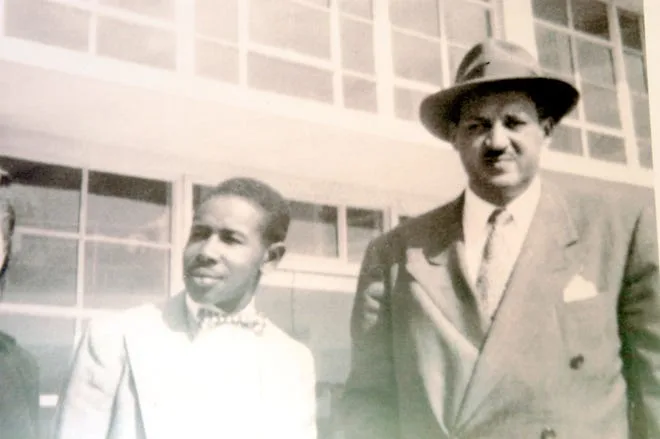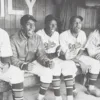
Columbia City Council is set to vote on a proposed statue which would honor and commemorate an historic piece of the city’s history, while also tying in with its eventual national impact.
The vote, which will take place at the council’s Nov. 9 regular meeting Thursday, would approve the installation of a statue of former Supreme Court Justice Thurgood Marshall to be located at the intersection of South Main and East 8th streets.
The statue would recognize and honor Marshall’s role in Columbia during the 1946 Race Riot, or what’s commonly known as the Columbia Uprising, which historians and supporters of the proposed project say played a pivotal role in what would become the U.S. Civil Rights Movement.
The project was presented in October to the council by members of the Columbia Peace and Justice Initiative. The group is overseeing much of the work envisioned along the city’s historic East 8th Street district, which was once a thriving community for Black citizens, black-owned businesses, as well as the site in which the 1946 riots occurred.

During the council’s Nov. 2 study session, the council again discussed the project, while also hearing additional comments from CPJI members.
“The construction of this particular statue is incumbent to the Maury County Community, not just Columbia,” Mt. Pleasant resident and attorney Ronda Hooks said. “Legacy, heritage and a sense of community is, of course, incumbent for all of our young people coming forth. And I do believe that Thurgood Marshall stands for, today, the same things that all of us should stand for. His legacy is tremendous.”
Statue proposal draws differing views
Since the project’s initial talks, it has gained support from many community members, but also spawned differing opinions about whether Marshall is the best choice for a historical figure representing the 1946 Uprising on the street.
More:‘Forgotten history’: Can Columbia’s East 8th Street neighborhood be revitalized?
In a column issued to The Daily Herald, Maury County Archives Director Tom Price stated that, while Marshall is a key figure in the 1946 events, there were also local citizens involved which could serve as a more fitting tribute.
“The Columbia Uprising was a local event that represents a pivotal change in American Civil Rights. It culminated in Columbians, many of whom were WWII veterans just home from fighting oppression across the globe, making a stand and saying that they, as Black Americans, would no longer be treated in the manner in which they had been prior to the war,” wrote in an Oct. 16 opinion column.
“If the purpose of this statue is to commemorate the Columbia Uprising, I would submit that there were local heroes who truly deserve a memorial.”
Price suggested James Stephenson and his mother as possible choices, who stood up to discrimination from a white business owner, an act that spurred the eventual uprising, as well as the key attorney trying the case, Alexander Looby. He cited that Marshall was ill throughout much of the trial and had to hospitalized, only making it to Columbia a couple of times, participating in jury selection and ultimately being threatened by local police during his last visit.
More:Maury archives director: Locals in Columbia Uprising could be considered for statue
In response, CPJI members, such as former Vice Mayor Christa Martin, argued that while there are many local citizens deserving of acknowledgement, the heart of the story is how it reached a national audience, and that national figures associated with Columbia’s local history should be part of the legacy as well.
“We still have the same feelings about this statue coming into our presence here in Columbia, Tennessee,” Martin said. “Our community needs to continue to tell our story, and it is important that we also include our national figures. [Marshall] was my Supreme Court justice just like he was yours, and so as we tell our story that man was here in Maury County, is a part of the legacy of the Eisenhauers, part of the legacy of what President Eisenhauer’s wife did as far as putting together a commission and making sure all people were represented across our nation.”
In addition to Marshall’s statue, CPJI plans to install an historic information plaque detailing the events, as well as other notable figures.
Much of the 1946 event’s history can also be read on a plaque erected at the former A.J. Morton Funeral Home, a key spot of communication during the 1946 Uprising on East 8th Street. The historical marker was dedicated in February of 2016, through the work of the Maury County African American Heritage Society. The Maury County AAHS, led by county historian Jo Ann McClellan, has helped to install at least five historical markers around the city, dedicated to honoring Black history in Maury County.
More:African American Heritage Society dedicates A.J. Morton Funeral Home

Council members, such as DaVeena Hardison, Debbie Wiles, Tony Greene and Mayor Chaz Molder, echoed Martin and the CPJI’s support for the project.
“As we look at an area that was deteriorating, we talk about it’s history and the monumental steps that have been taken upon that fateful day, which will forever shape the minds and hearts of the citizens who live in this city … we want to preserve the history, making sure it’s told the right way. Not with speculation, but with pure facts. With that love we have for each other, and our community, I think we are going in the right direction.”
The timeline for the project remains undetermined pending the council’s Nov. 9 vote, but would occur in conjunction with the previously approved roundabout to be installed at the East 8th and South Main intersection, which would also include upgrades to sidewalks along East 8th, formerly known as “The Bottom.”
“Of course we’ve heard some things over the last week of some individuals having opinions about this, which they are entitled to and what makes us great,” Molder said.
“One thing that was pointed out is that Thurgood Marshall did not have as big a part of this story as others did, which is true. But in my opinion, there is no bigger individual to the story in terms of our national history than Thurgood Marshall and what he did over the course of his career.”
Jay Powell is a reporter for The Daily Herald. To receive the daily news in your inbox, please subscribe to The Daily Herald’s newsletter at https://www.columbiadailyherald.com.


